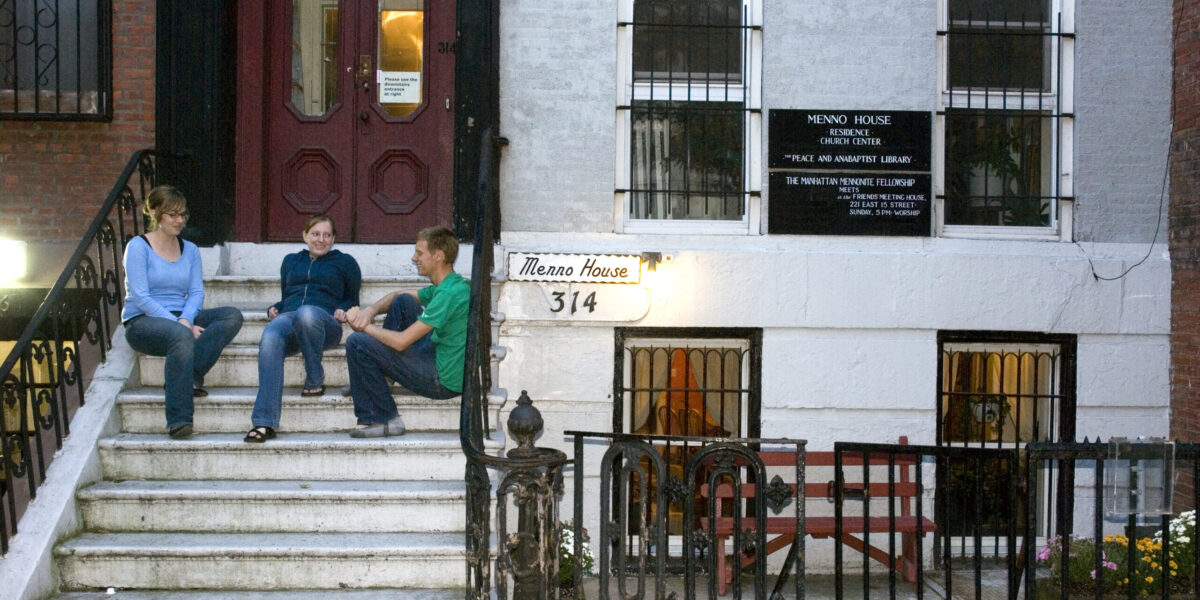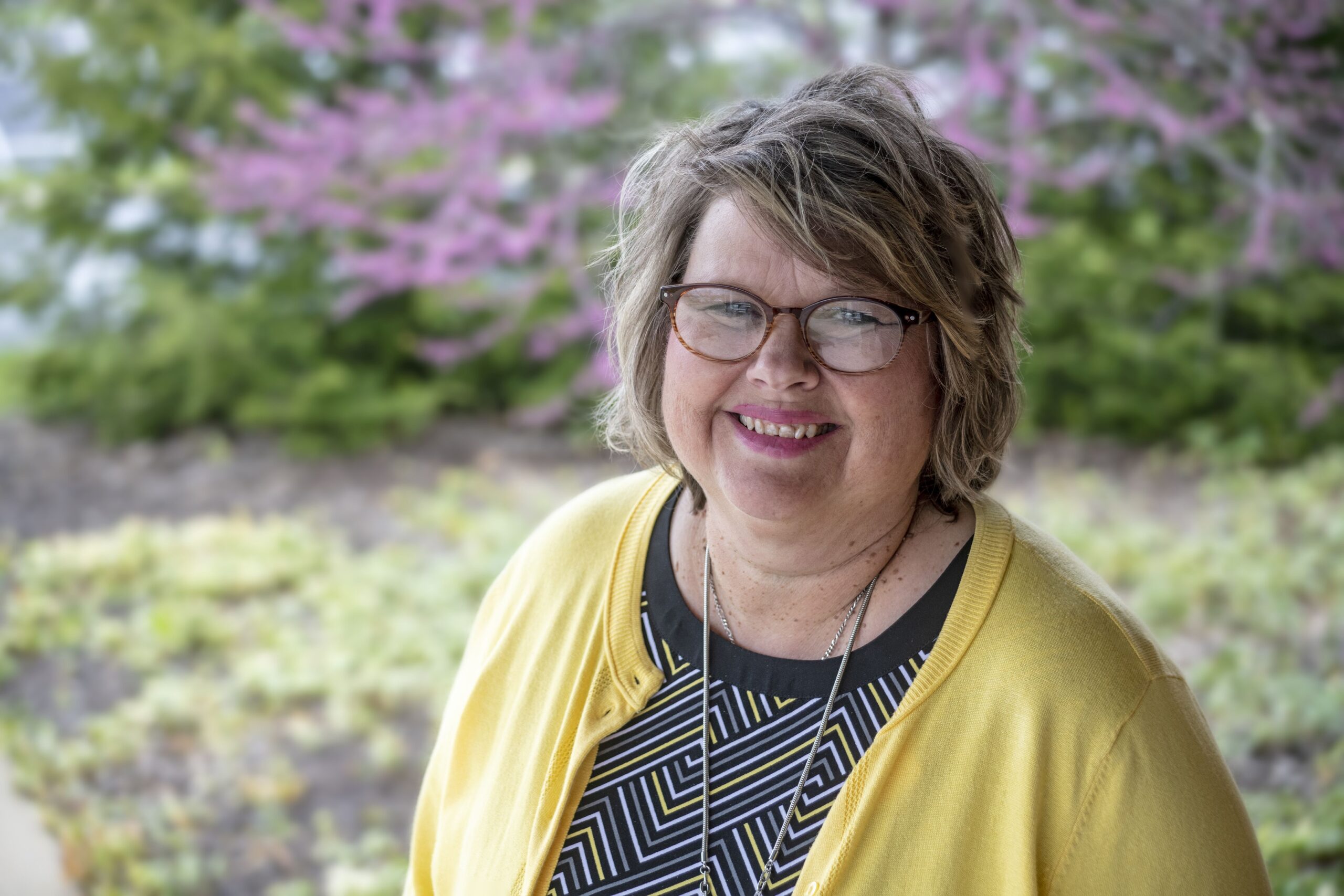NEWTON, Kansas (Mennonite Mission Network) —After two-plus decades of housing Mennonite Voluntary Service (MVS) participants such as Jessica Penner, the New York City unit closed earlier this year. Yet, Penner believes the closure will never obscure the new vistas that the Mennonite Mission Network program opened up for her ongoing life’s journey.
In a recent interview, Penner described how as a small town, Mennonite Kansas girl, she dreamt of living in NYC one day. And because of MVS, that dream came true in a way that allowed her to be a servant rather than a tourist. One of her first powerful memories of the city was when she attended a prayer vigil, marking the first anniversary of 9/11.
"Ground Zero was literally still Ground Zero at that point," she said. "A crowd made up of Muslims, Jews, Christians from various denominations, agnostics, atheists, and people of many races all gathered together. I had always dreamt of living in New York, but it was not until I saw it in action that I realized just how much power there is in experiencing all that unity in diversity."
Penner said she had seen the tragedy unfold on television. But "to meet in person the people who fled the fire and dust, or [Afghans] whose neighbors shunned them after 9/11, really hit my heart in a more profound way," she said.
Penner and Tom Smith, her husband and fellow MVS participant, who together came to the city in July 2002, still call NYC home today. Penner and Smith are two of several dozen MVS participants who served through the unit, which was called Menno House. Participants related to its host congregation, Manhattan Mennonite Fellowship (MMF), from 1995 until the unit’s closure this year. However, MMF still owns this four-story brownstone and uses for hospitality ministry and church offices.
During her two-year term, Penner volunteered at Pax Christi Metro New York, a Catholic Peace organization, and at Metro Baptist Church. Smith served at the Lower East Side Harm Reduction Center, a drug needle exchange program. Today, Smith is fully employed as an associate director at the center, renamed Alliance for Positive Change. Penner is a writer, who teaches English composition and creative writing at New York City College of Technology, as well as English as a Second Language at 32BJ, a building service workers’ union.
Ending brick-and-mortar unit, continuing long legacy
From 2017 to 2019, Penner was also the liaison between MMF and Mission Network, and as a result, faced a sad task. In 2021 — after a sabbatical/pandemic year in 2020 — she helped MMF discern that it was time to retire their formal MVS program.
To adjust to the realities of how people are choosing to serve, Mission Network made the decision to change MVS in a way that provided more autonomy, flexibility and creativity for local units as they continue serving alongside their communities, said Marisa Smucker, MVS director, in a recent interview.
Penner said, "This change meant that MMF was not in a position to continue supporting a unit. At the same time, however, we don’t believe that shutting down a unit means the shutting down of the longtime service legacy of Mennonites in the city."
This legacy had been set in motion well before the mid-1990s. The past 25 years has only been one era in which Mennonites have provided this conduit, said Dale Stoltzfus, a longtime Mennonite leader, now serving as a conference minister for Lancaster Mennonite Conference (LMC).
In a recent interview he said he was one of many conscientious objectors (COs) seeking alternative service opportunities in NYC during the Vietnam War era. He was drafted in 1959 and came to the city with his wife, Doris, to serve at the New York University Medical Center. They lived in a voluntary service unit at 314 E. 19th St. MMF later purchased the 19th St. property and renamed it Menno House.
NYC changed his life, he said. "In doing video work with our grandkids, I told them that I was working in a grocery store in rural Pennsylvania, near to our farm in Gap, when I got drafted," Stoltzfus said. "I am grateful that all our kids grew up in the city and gained an intercultural and interracial perspective. … I get depressed when I think what my life would have been like if I had not been drafted and gone there."
When the influx of conscientious objector volunteers slowed, Mennonite congregations in the Bronx and in the Harlem neighborhood of Manhattan began sponsoring youth programs, Stoltzfus said. He recalled that many volunteers engaged with those programs while living at a unit house on Sherman Avenue in the Bronx that operated from the early 1970s to the mid-1990s. Voluntary service efforts at that location were sponsored by Eastern Mennonite Missions. Mission Network records show that from the late 1950s through the close of the current MVS unit, 69 voluntary service participants served at sites throughout the five boroughs.
"What is most distinctive about those earlier voluntary service eras is that many of us who engaged in the city never really went home again to the farm and small towns," he said. "Many of us became pastors and seminary graduates and other leaders throughout the church."
Other examples of young people who came to the city and stayed for varying lengths of time include Sylvia Shirk, and current NYC residents Clarke Bell and Kylee Schunn. Schunn was one of the last MVS participants in NYC.
Shirk, now a resident of Portland, Oregon, served as a former MMF pastor and as MVS local program coordinator in the years spanning 2006 through 2017. "The long arch of MVS in NYC was really foundational to the church in the city," she said in a recent interview.
Shirk first experienced NYC while participating in a two-week voluntary service opportunity sponsored by LMC, as a high school student in 1967. "I had a wonderful experience, and I never imagined that the same bedroom I stayed in as a teenager would later be my office as pastor and local program coordinator."
Bell, a current MMF member, participated in MVS in NYC from the late 1980s through the early 1990s. "The commitment of some members of MVS at the time was to seek to live the gospel of Jesus in radical ways among the poor of North America," he wrote. "This often-shared MVS commitment to following Jesus among the poor with institutional support, coupled with the sharing of faith stories, made a very strong impact on my life."
His shared that he engaged in "little gospel experiments" among people experiencing homelessness at various times, as a squatter, shelter resident, and as a presence among the redeemers of cans and bottles on the streets and at a redemption center called "We Can."
Being part of the ongoing legacy beyond unit life
Schunn, who grew up in Whitewater, Kansas, chose to stay in NYC after her term ended and continued living at Menno House during the COVID-19 lockdown. She is still living there today and is a social worker at the Center for Urban Community Services, a permanent housing complex.
"It was really difficult to stick out the pandemic in the city last year, but I am really grateful I did," Schunn said. "Living at Menno House with others going through struggles provided important solidarity. … Choosing to come to NYC and to stay have revealed how important it has been for me to live out my childhood values in a larger and challenging place."
Indeed, Penner said the legacy of MVS continues — not in a service unit per se, but in the hearts of servants, and the marks of people who left a piece of their hearts and moved on, or stayed, like herself. She was 23 when she first came to NYC and is now 42 and celebrating her 19th wedding anniversary. "The legacy is not about a program but about people whose spirit of service lives on," she said.
Smucker agrees. "Mission Network will forever be grateful for MMF’s call and continued commitment to participate in God’s work in the city, and an ongoing force for passing on the values of service," she said.








